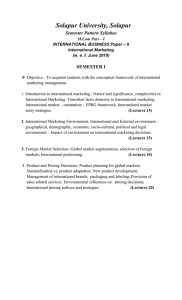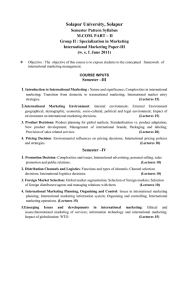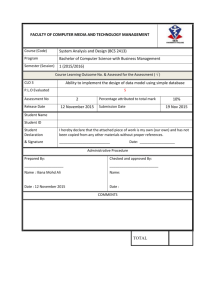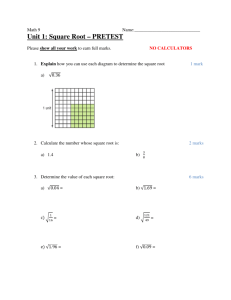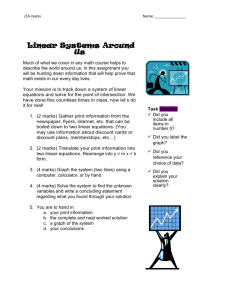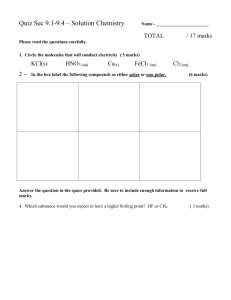M.Com.I International Business P-I
advertisement
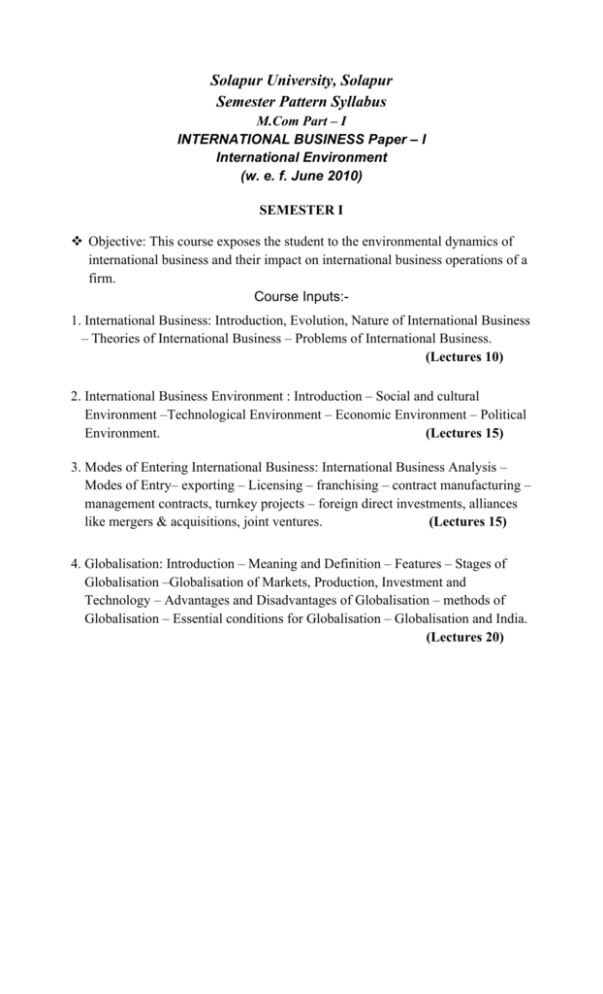
Solapur University, Solapur Semester Pattern Syllabus M.Com Part – I INTERNATIONAL BUSINESS Paper – I International Environment (w. e. f. June 2010) SEMESTER I Objective: This course exposes the student to the environmental dynamics of international business and their impact on international business operations of a firm. Course Inputs:1. International Business: Introduction, Evolution, Nature of International Business – Theories of International Business – Problems of International Business. (Lectures 10) 2. International Business Environment : Introduction – Social and cultural Environment –Technological Environment – Economic Environment – Political Environment. (Lectures 15) 3. Modes of Entering International Business: International Business Analysis – Modes of Entry– exporting – Licensing – franchising – contract manufacturing – management contracts, turnkey projects – foreign direct investments, alliances like mergers & acquisitions, joint ventures. (Lectures 15) 4. Globalisation: Introduction – Meaning and Definition – Features – Stages of Globalisation –Globalisation of Markets, Production, Investment and Technology – Advantages and Disadvantages of Globalisation – methods of Globalisation – Essential conditions for Globalisation – Globalisation and India. (Lectures 20) SEMESTER II 1. World Trade Organization:- WTO – Introduction – GATT – Establishment of WTO – The Uruguay Round Package – Organisation Structure of the WTO – WTO and Anti-dumping measures – India & WTO – Intellectual Property Rights (Lectures 15) 2. Multinational Corporations :- Definition Distinction Among International Corporation MNC, Global corporation –Transnational corporations-Factor contributed for the growth of MNCS Advantages and disadvantages of MNCscontrol over MNCs- organization Design in India. (Lectures 20) 3. Regional Economic co-operation- Types and rational of regional economic groups. Theory of customs union , EU, NAFTA , ASEAN, SAFTA, and other groupings. SAARC. (Lectures 15) 4. Recent Developments In International Business: Ecological issues, Social aspects, It and International Business (Lectures 10) Reference: Books1. Sundaram and Black – The International Business Environment- Prentice Hall, New Delhi 2. P. Subba Rao , International , Business, Himalaya Publishing House –Mumbai, Nagpur- Aug 2001. 3. Adhikary , Manab , Global Business Management- Mcnillan –New Delhi 4. Bhattacharya , B- Going International –Response Strategies for Indian Sector – Wheeker Publishing Co-New Delhi. 5. Gosh, Biswanath, Economic Environment of Business, South Asia Book – New Delhi. 6. Letiche, John M. – International Economics Policies and Theoretical Foundations, Academic Press – New York. 7. Parvez Asheghian and Bahman Ebrahim International Business – Harper Collins – London. Solapur University, Solapur Nature of Question Paper For Semester Pattern • Faculty of Commerce (B.Com., M.Com.) Model Question Paper (w.e.f. June 2010) Time: - 2 hrs. Q. 1 Q. 2 Q. 3 Q. 4 Q. 5 Multiple choice questions (four alternatives should be given) 1 ---------------------------------------------------(a) (b) (c) (d) 2 3 4 5 6 7 8 9 10 Answer the following (Short note/Short problem/Short answer) (A) Total Marks-50 10 05 (B) Answer the following (Short note/Short answer/Short problem) (A) 05 05 (B) 05 Answer any one (Long answer/Problem) i) ii) Answer any one (Long answer/Problem) i) ii) 10 10 1. Structure of the courses :A) Each paper of every subject for Arts, Social Sciences & Commerce Faculty shall be of 50 marks as resolved by the respective faculties and Academic Council. B) For Science Faculty subjects each paper shall be of 50 marks and practical for every subject shall be of 50 Marks as resolved in the faculty and Academic Council. C) For B. Pharmacy also the paper shall be of 50 marks for University examination. Internal marks will be given in the form of grades. D) For courses which were in semester pattern will have their original distribution already of marks for each paper. E) For the faculties of Education, Law, Engineering the course structure shall be as per the resolutions of the respective faculties and Academic Council. 2. Nature of question paper: A) Nature of questions. “20% Marks - objectives question” (One mark each and multiple choice questions) “40% Marks - Short notes / Short answer type questions / Short Mathematical type questions/ Problems. (2 to 5 Marks each) “40% Marks - Descriptive type questions / Long Mathematical type questions / Problems. (6 to 10 Marks each) B) Objective type question will be of multiple choice (MCQ) with four alternatives. This answer book will be collected in first 15 minutes for 10 marks and in first 30 minutes for 20 marks. Each objective question will carry one mark each. C) Questions on any topic may be set in any type of question. All questions should be set in such a way that there should be permutation and combination of questions on all topics from the syllabus. As far as possible it should cover entire syllabus. D) There will be only five questions in the question paper. All questions will be compulsory. There will be internal option (40%) and not overall option. for questions 2 to 5. 3. Practical Examination for B. Sc. I. will be conducted at the end of second semester. 4. Examination fees for semester Examination will be decided in the Board of Examinations. The structures of all courses in all Faculties were approved and placed before the Academic Council. After considered deliberations and discussion it was decided not to convene a meeting of the Academic Council for the same matter as there is no deviation from any decision taken by Faculties and Academic Council. Nature of Question Paper approved by Hon. Vice Chancellor on behalf of the Academic Council.
